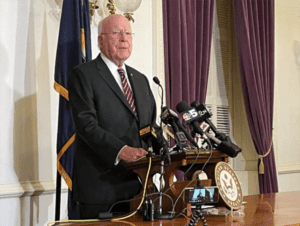By Lola Duffort and Sarah Mearhoff/VTDigger
After eight terms and nearly five decades in office, U.S. Sen. Patrick Leahy is retiring.
He announced his decision during a press conference at the Statehouse Monday morning that was attended by members of the media and his supporters, including his wife, Marcelle.

U.S. Sen. Patrick Leahy, D-Vt., speaks at the Vermont State- house in Montpelier on Monday, Nov. 15, 2021.
“While I will continue to serve Vermont, Marcelle and I have reached the conclusion that it is time to put down this gavel,” Leahy said. “It is time to pass the torch to the next Vermonter who will carry on this work for our great state.
“It’s time to come home.”
Leahy’s highly anticipated announcement will have profound implications for the political landscape in Vermont and in Washington.
Now 81, Leahy is the fifth-longest-serving senator in U.S. history.
But while his longevity in Congress has helped give the tiny state of Vermont an outsized influence on the national stage, it has also created a political bottleneck back home.
Leahy’s plans have been the source of both frenzied speculation and ambivalence in Vermont. Many would like to see a changing of the guards, and the opportunity for new leadership. But plenty fear the state will lose out on funding when Leahy steps down.
There has not been an open congressional seat in Vermont since 2006, when then-U.S. Sen. Jim Jeffords announced he was retiring after 18 years in the Senate.
At the time, then-U.S. Rep. Bernie Sanders decided to vacate his seat and make a play for the upper chamber. His successor in the House, U.S. Rep. Peter Welch, who has held Vermont’s lone at-large congressional seat for the last 14 years, is widely expected to follow in Sanders’ footsteps and run for Leahy’s now-open seat.
Vermont is also the only state in the country that has never sent a woman to Congress, and there is enormous political pressure — particularly in Democratic circles — to change course.
Three Democratic women are already considered top contenders in a congressional race: Vermont Senate President Pro Tem, Becca Balint, D-Windham; Democratic Lt. Governor Molly Gray; and Vermont Sen. Kesha Ram Hinsdale, D-Chittenden.
All three have suggested that if they run, they would not challenge either Leahy or Welch.
Gov. Phil Scott, a Republican who enjoys extraordinarily high support among Democrats, is certain to face strong pressure to throw his hat in the ring.
The governor and his team have long maintained that Scott has little interest in going to Washington, but in a glowing profile that appeared in The Atlantic this spring, Scott stopped just short of closing the door on a congressional run.
Leahy was in the national limelight when he presided over the second impeachment trial of President Donald Trump, and he previously chaired the Agriculture, Nutrition and Forestry and Judiciary committees.
But the depth of his influence comes chiefly from his place within the all-powerful Appropriations Committee. He became a ranking member of the panel in 2017, and this year, after Democrats took the Senate, he finally became its chair.
Leahy’s perch on the money committee has helped steer billions to the state, and he is credited with creating the small-state minimum that so disproportionately benefited Vermont when the federal government doled out Covid relief aid.
Leahy is also the president pro tempore of the Senate, a largely ceremonial position that nonetheless puts him third in line for the presidency.




